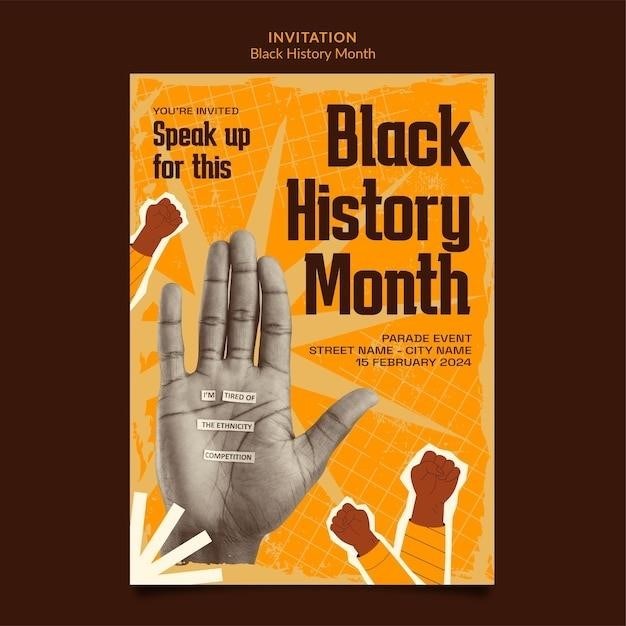Finding Digital Resources on African American History
Numerous online archives, such as the National Archives and the Library of Congress, offer digitized primary source materials relating to African American history. These resources include documents, photographs, and oral histories, providing invaluable insights into the Black experience.
Online Archives and Repositories
The digital landscape offers a wealth of resources for researching African American history. The National Archives provides extensive online access to records documenting the African American experience, including materials related to the Civil Rights Movement and slavery. Their catalog allows for targeted searches within their extensive collection. Similarly, the Library of Congress’s online collections contain a vast array of primary source documents, photographs, and other materials relevant to African American history, culture, and contributions. These institutions digitize and make accessible a large number of primary source materials, offering researchers a convenient way to access important historical documents. Other online repositories, such as university archives and specialized historical societies, also hold significant collections related to African American history, many of which are increasingly being made available online.
National Archives and Records Administration
The National Archives and Records Administration (NARA) holds a significant collection of primary source materials related to African American history. These resources are increasingly available online through their digital catalog. Researchers can access records documenting various aspects of the African American experience, from slavery and emancipation to the Civil Rights Movement and beyond. NARA’s website provides tools to search their extensive holdings, allowing users to locate relevant documents, photographs, and other materials. The online catalog provides detailed descriptions of each item, including dates, subjects, and creators, facilitating efficient research. Furthermore, NARA actively works to digitize and make accessible additional materials, continuously expanding the online resources available to scholars and the general public interested in exploring African American history. Their commitment to preserving and sharing these records makes NARA an essential resource for anyone studying this crucial aspect of American history.
Library of Congress Digital Collections
The Library of Congress offers a vast array of digitized primary source materials pertinent to African American history within its digital collections. These resources encompass a wide range of formats, including photographs, manuscripts, maps, and audio-visual recordings. The Library’s online catalog allows users to search for specific items or explore broader themes related to the African American experience. Many materials are freely accessible online, while others may require on-site access or special arrangements. The Library of Congress actively works to expand its digital collections, continually adding newly digitized materials. Researchers can discover personal narratives, official documents, and artistic works that illuminate different aspects of African American history and culture. This makes the Library of Congress a crucial digital repository for those exploring this rich and complex historical narrative. Their commitment to making these materials accessible is vital for research and education.
Key Primary Source Documents
Unlocking the past⁚ Explore firsthand accounts through speeches, letters, and personal narratives – crucial primary sources for understanding African American history.
Speeches and Transcripts
A treasure trove of powerful voices awaits discovery within digitized collections of speeches and transcripts. These primary sources offer direct access to the words of influential African American figures throughout history. From the fiery rhetoric of abolitionists to the moving calls for civil rights, these speeches reveal the hopes, struggles, and triumphs of a people. Imagine reading the exact words of Martin Luther King Jr., Sojourner Truth, or Frederick Douglass – their impassioned pleas for justice echoing across time. These transcribed speeches provide invaluable context, allowing researchers to analyze not only the content but also the delivery and impact of these historical moments. Accessing these digital archives provides a unique opportunity to engage directly with the voices that shaped African American history.
Letters and Personal Accounts
Delve into the intimate lives and experiences of ordinary and extraordinary African Americans through the power of personal letters and accounts. These invaluable primary sources offer a glimpse into the everyday realities, hopes, fears, and dreams of individuals throughout history. Discover the hidden narratives within family correspondence, revealing the strength and resilience of communities facing adversity. Explore the intimate thoughts and feelings expressed in personal diaries and journals, providing an unfiltered perspective on historical events. These digital archives offer a profoundly humanizing element to the study of history, revealing the individual stories that contribute to the larger narrative of the African American experience. Such resources allow researchers and readers to connect with the past on a deeply personal level.

Scholarly Resources and Textbooks
Access in-depth analyses of African American history through peer-reviewed academic journals and articles, and explore comprehensive open-access textbooks offering diverse perspectives.
Academic Journals and Articles
Delve into the rich scholarship on African American history by exploring reputable academic journals. Publications such as the Journal of Black Studies and the Journal of Blacks in Higher Education provide critical analyses and in-depth research on various aspects of the Black experience. These journals offer articles written by leading scholars, covering topics ranging from the transatlantic slave trade to contemporary social justice issues. Access to these journals may often require subscriptions or institutional affiliations, but many university libraries provide access to their digital archives. Furthermore, online databases like JSTOR and Project MUSE offer extensive collections of scholarly articles on African American history, allowing researchers to explore a broad range of perspectives and interpretations. Remember to critically evaluate sources and consider the author’s perspective and methodology.
Open Access Textbooks on African American History
For readily available and cost-effective learning resources, explore open-access textbooks on African American history. These digital textbooks, often available as PDFs, provide comprehensive overviews of key historical periods and themes. Many are created and maintained by educators and scholars, ensuring accuracy and scholarly rigor. Platforms like OpenStax and other institutional repositories frequently host these materials, making them easily accessible to students and researchers alike. The availability of open-access textbooks significantly expands access to education and fosters a more inclusive learning environment. Remember to check the publication date to ensure the information is current and to evaluate the credibility of the authors and publishing institution. These open resources can serve as valuable complements to traditional textbooks and primary source materials.

Exploring Specific Historical Periods
Delve into focused studies of pivotal eras, from the transatlantic slave trade’s impact to contemporary social justice movements, using diverse online resources.
The Transatlantic Slave Trade and its Impact
The transatlantic slave trade, a brutal system lasting centuries, irrevocably shaped the African American experience. Millions of Africans were forcibly transported to the Americas, enduring unspeakable suffering and exploitation. Digital resources illuminate the trade’s devastating effects on African societies, families, and individuals. Explore primary source documents like slave ship manifests and personal narratives to understand the human cost. Analyze the economic and social structures that were built upon enslaved labor, and how these systems persisted long after the trade’s official abolition. Examine the resilience and resistance of enslaved people, their cultural preservation, and their enduring legacy in the face of unimaginable adversity. Investigate the lasting impacts on descendants, including the ongoing struggle for racial justice and equality. Many online archives offer detailed information and analyses of this critical period in history.
The Civil Rights Movement and its Aftermath
The Civil Rights Movement, a pivotal period in American history, fought for racial equality and an end to systemic discrimination. Digital archives offer a wealth of information on this era, including speeches, photographs, and personal accounts from key figures like Martin Luther King Jr. and Rosa Parks. Explore the strategies employed by activists, from peaceful protests to legal challenges, and analyze their impact on society. Examine the landmark legislation, such as the Civil Rights Act of 1964 and the Voting Rights Act of 1965, and their role in dismantling segregation. Consider the movement’s successes and limitations, including the ongoing struggle for racial justice. Investigate the lasting impact on American society, including the progress made and the challenges that remain in achieving true equality. Many online resources provide detailed accounts of this transformative period and its enduring consequences.
Contemporary Issues and Ongoing Struggles
While significant progress has been made, the fight for racial justice continues. Contemporary issues facing African Americans include systemic racism in areas such as criminal justice, housing, education, and employment. Digital resources document the ongoing struggle against police brutality, mass incarceration, and economic inequality. Explore the Black Lives Matter movement and its impact on raising awareness about these pressing issues. Examine the ongoing debates surrounding affirmative action, reparations, and the representation of African Americans in media and politics. Analyze the intersectionality of race with other social identities, such as gender, class, and sexual orientation, and how these factors contribute to systemic inequalities. Scholarly articles, news reports, and personal narratives offer valuable perspectives on the complexities of these contemporary challenges and the ongoing efforts to achieve a more just and equitable society.




Leave a Reply
You must be logged in to post a comment.